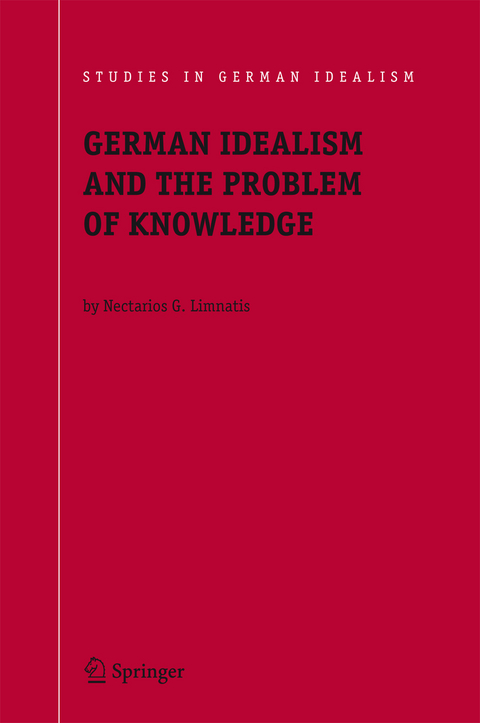
German Idealism and the Problem of Knowledge:
Springer (Verlag)
978-90-481-7991-6 (ISBN)
The movement of German idealism culminates in the revelation of the re? ective boundaries of theoretical knowledge. The history of the most important intellectual developments thereafter could be described, following a recent remark of Jurgen Habermas, as a his- 1 tory of the de-transcendentalization of the cognizing subject. In this context, the epistemological interpretation proposed in this book must be speci? cally understood. Examining the problem of knowledge in the development of German idealism, it aims not at an epistem- ogy of the Cartesian type, and even less at a formal logical analysis of knowledge which lacks the re? ective element of the devices it employs as "the search for the immutable structures within which knowledge, 2 life, and culture must be contained. " These "structures" do not only condition the process of knowledge, they are themselves conditioned. There is thus an unsurpassable circle in this process, a circle which German idealism brings to the surface and profoundly scrutinizes. Therefore, the task is to re? ectively account for the historical horizons in which cognition arises (being ultimately thereupon dependent), instead of searching for an ultimate Archimedean point for its deduction.
Rather than searching for inexplicably transc- dental concepts, this argument points to their determination from within a given Lebenswelt. It does not renounce but rather rede? nes 3 objectivity, by seeing the subject as a coming-to-know-itself totality. 1 J. Habermas, Wahrheit und Rechtfertigung. Philosophische Aufsatze (Frankfurt a. M. : Suhrkamp, 1999), p. 186.
Nectarios G. Limnatis received a Ph.D. (2004) from the Department of Philosophy, Graduate Faculty of Political and Social Science, New School for Social Research, and another Ph.D. (1996) from the Faculty of Philosophy, Moscow State University. His research interests span the History of Philosophy (particularly, German Idealism from Kant to Hegel and Marx), 20th Century Continental Philosophy, Social and Political Philosophy, and Ethics. He has taught at various universities in Europe and the USA, and is currently teaching at Hofstra University in New York. Besides articles and book reviews in several languages, he has written Manipulation: Essence, Appearances, Ways of Sublation (Moscow: Ekonomycheskaya Demokratya 2000, in Russian), and co-edited Prospettive sul Postmoderno, vol. 1: Considerazioni epistemologiche, vol. 2: Ricerche etico-politiche (Milano: Edizioni Mimesis, 2006, in Italian). At present, he is working on the edition of a book called The Contours of Hegel’s Dialectic (forthcoming). Further projects include A Critical Theory of Globalization and Hegel and Analytic Philosophy.
1. Epistemology or Metaphysics? The Kantian Background. 1.1 Scientific Metaphysics? 1.2. Transcendentalism versus Realism? 1.3. The Ontological Facet: the Transcendental Self and the Thing-in-itself. 1.4. From the Ontological to the Logical. Understanding, Reason and Totality. 1.5. The Logical Facet: Kant’s Relation to Formal Logic and the Problem of Contradiction.- 2. From Epistemology to Metaphysics: Fichte and Schelling. 2.1. Fichte: The Thing-in-itself and the Dialectical Leap. 2.2. Schelling: Epistemology and the Resurrection of Metaphysics.- 3. From Metaphysics to Epistemology I: From the Phenomenology to the Logic or Hegel’s Claim for Absolute Knowing and its Meaning. 3.1. Idealism, Reason and Contradiction in the Early Hegel. 3.2. Hegel’ Phenomenology. The Coming to be of the Self and the Question of Intersubjectivity. 3.3. The Transition to Self-Consciousness and Idealism.- 4. From Metaphysics to Epistemology II: Logic and Reality. 4.1. The Idea of an Epistemological Reading of the Science of Logic. 4.2. Toward an Epistemological Totality. Conclusion. Bibliography.
| Reihe/Serie | Studies in German Idealism ; 8 |
|---|---|
| Zusatzinfo | XVI, 428 p. |
| Verlagsort | Dordrecht |
| Sprache | englisch |
| Maße | 155 x 235 mm |
| Themenwelt | Geisteswissenschaften ► Philosophie ► Allgemeines / Lexika |
| Geisteswissenschaften ► Philosophie ► Erkenntnistheorie / Wissenschaftstheorie | |
| Geisteswissenschaften ► Philosophie ► Geschichte der Philosophie | |
| Geisteswissenschaften ► Philosophie ► Logik | |
| Geisteswissenschaften ► Philosophie ► Philosophie der Neuzeit | |
| Naturwissenschaften | |
| Schlagworte | Fichte |
| ISBN-10 | 90-481-7991-2 / 9048179912 |
| ISBN-13 | 978-90-481-7991-6 / 9789048179916 |
| Zustand | Neuware |
| Haben Sie eine Frage zum Produkt? |
aus dem Bereich


